#FRELIMO
Text

Role de la poésie dans la révolution monzambicaine, Bulletin du FRELIMO, juillet 1969, «Souffles» أنفاس – revue culturelle arabe du maghreb, No. 19, (pp. 82-95), 1970, Rabat [Bibliothèque nationale du Royaume du Maroc, Rabat. Bibliothèque nationale de France, Paris]
Frente de Libertação de Moçambique FRELIMO













Document archive: Nos. 1-22 (1966-1971), Internet Archive
#graphic design#art#poetry#journal#magazine#souffles#anfas#abdellatif laâbi#frente de libertação de moçambique#frelimo#bibliothèque nationale du royaume du maroc#bibliothèque nationale de france#internet archive#1970s
9 notes
·
View notes
Text
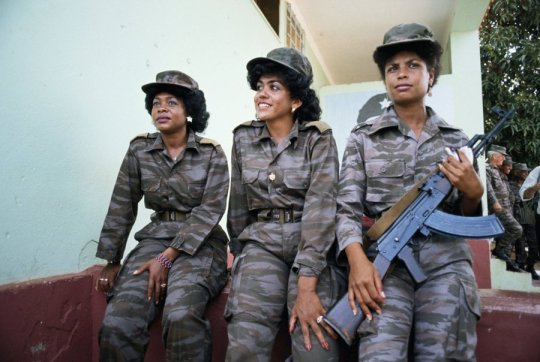

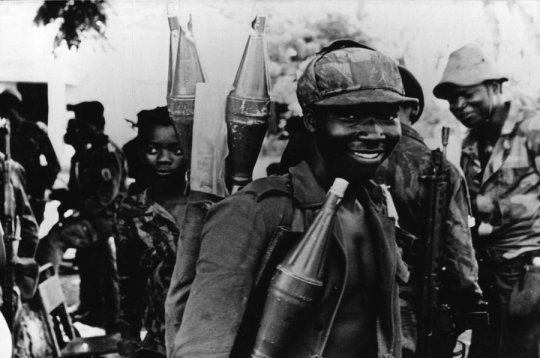


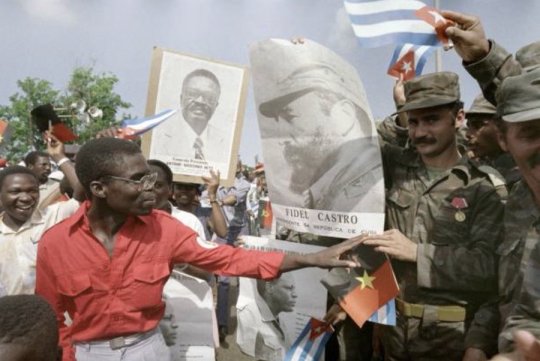

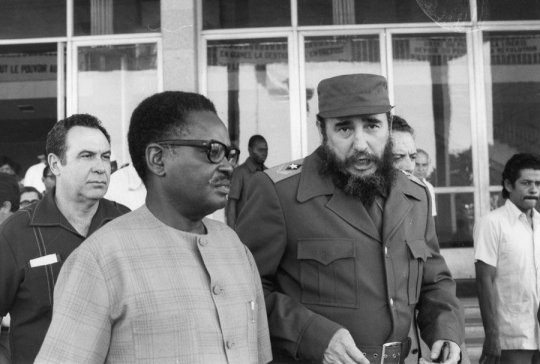

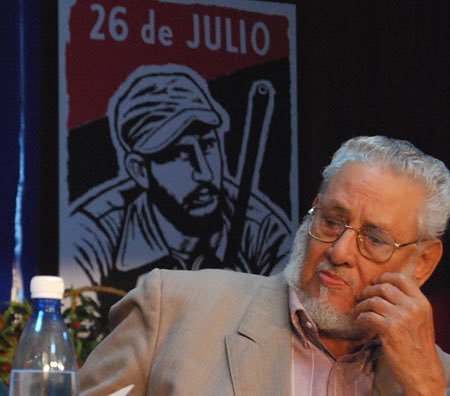
1.On this day in 1975, Cuba began Operation Carlota, its most important military internationalist mission in Africa. It was a major undertaking that contributed to the defeat of the apartheid military regime in South Africa & the independence of Angola & Namibia. More of the story:
2.Across Africa, Cuba provided military instructors & doctors, helping rebels gain their independence from Europeans. After the Portuguese dictatorship fell in 1974 & Portugal prepared to grant Angola independence on Nov. 11, 1975, three local movements fought to take power.
3.The largest rebel group with most popular support was the People’s Movement for the Liberation of Angola (MPLA). They were providing critical training & safe haven to other national liberation forces like the ANC (South Africa), SWAPO (Namibia), and FRELIMO (Mozambique).
4.In early November, the Apartheid South African Army was advancing 45 miles per day toward the capital Luanda. South Africa’s invasion endangered not only Angola’s revolution, but the struggle for liberation throughout the continent.
5.The racists wanted to install a puppet regime led by CIA collaborator Jonas Savimbi who would be ok with white rule in South The MPLA leaders, then understood that only an urgent appeal for international solidarity would enable them to fight of this invasion & secure independence.
6.The Angolans had one unlikely country they could turn to: Cuba. They had already provided military instructors to assist the MPLA. The answer came less than 48 hours later on Nov. 5. Yes. Fidel Castro & the Communist Party of Cuba reached its decision without thinking twice.
7.On another Nov 5 in 1843, a slave called Black Carlota, working on the Triunvirato plantation in the Matanzas region, took up her machete in a slave rebellion in which she lost her life. It was in homage to her that the solidarity action in Angola bore her name: Operation Carlota.
8.On Nov. 7, the first 82 soldiers, carrying light artillery, left to Angola. Over the coming weeks more than 10,000 Cuban troops would land in Angola. More than a decade later, at the end of apartheid, there would be as many as 36,000 troops fighting against the apartheid forces.
9.By the end of 1975, Cuban troops had routed the apartheid army & prevented their takeover of the country. The world owes Cuba and these internationalist soldiers a huge debt.
10.Cuban negotiator, Jorge Risquet and the defence of Cuito Cunavale.
SOURCE: Manolo De Los Santos@ manolo_realengo
#African Liberation#Angola#Cuban Revolution#Imperialism#Apartheid#South Africa#Operación Carlota#Revolutionary History#MPLA#African rebels#Revolutionary African Women#SWAPO#ANC#FRELIMO#Portuguese Colonization
51 notes
·
View notes
Link
“Samora revisitado após Guebuza“, resenha publicada no Jornal A Pátria (30/9/2022).
#mozambique#moçambique#samora machel#frelimo#politics#book reviews#leituras#livros#books#Silas Fiorotti#Allen Isaacman#Barbara Isaacman#ohio university press#history of mozambique#history of africa#african studies#estudos africanos
4 notes
·
View notes
Text
ANC Secretary General Fikile Mbalula is dwarfed by his Mozambican comrade Daniel Chapo, the presidential candidate of FRELIMO in the upcoming elections in #Mozambique.
Mr Chapo also visited SA president #CyrilRamaphosa.
The ANC and FRELIMO have tied dating back to pre liberation of South Africa. #BreakingNews #ANC #FRELIMO
0 notes
Text

0 notes
Text
Membros da Frelimo e Renamo entram em pancadarias no dia da paz em Quelimane
Em pleno dia da paz (04) os membros da Frelimo e Renamo entraram em pancadarias no momento da chegada do cabeça de lista do maior partido da oposição, Manuel de Araújo, e seus membros na praça dos heróis em Quelimane.
O ocorrido, deu inicio quando o cabeça de lista da Renamo e atual Presidente do Município de Quelimane, se deslocava junto da sua comitiva, ao pódio onde se encontravam os demais…

View On WordPress
0 notes
Photo

2:00 PM EST January 9, 2024:
Miles Davis - "Calypso Frelimo"
From the album Get Up With It
(November 22, 1974)
Last song scrobbled from iTunes at Last.fm
GUWI is probably my favorite Miles, which says quite a bit about me, I know
2 notes
·
View notes
Text
Like I really do wish people remembered more about the Anti-Imperial struggles of Southern Africa in the late 20th century. As incomplete as their revolutions may have been, with the politically free nations succumbing to the overwhelming force of Western Imperialism and being taken over by neo-colonial comprador regimes, what they did manage to achieve was still so very impressive. A struggle for human dignity against the most openly cruel and brutish forms of colonialism, the mobilisation and education of the most impoverished and super-exploited people on the planet in the name of not only liberating their own people but with the understanding that they were advancing the interests of humanity as a whole. Nationalist in character and internationalist in spirit, seeking to build independent nations that could co-operate in solidarity with all the progressive minded peoples of the world. Introducing healthcare, education and fair exchange into the forgotten and exploited parts of their country, giving a purpose to millions who enthusiastically gave their lives to defend and advance their gains both material and psychological.
The MPLA in Angola, FRELIMO in Mozambique, the alliance of ZANU and ZAPU in Zimbabwe, SWAPO in Namibia and the ANC of South Africa. It's also worth remembering the PAIGC of Guinea-Bissau and Cape Verde who, despite their geographical separation, faced a common enemy and so forged deep bonds with their comrades to the south. Whatever their eventual fates after independence, triumphs and failures alike, the struggles they fought against the reactionary White Supremacist regimes of Portugal, Rhodesia and South Africa were nothing short of heroic. Despite vast differences in space and time, I think these struggles hold both inspiration and lessons for progressives peoples all over the world to this day. It's truly a great shame how much they've been forgotten, these conflicts only ever brought up as a footnote to something more well known rather than as an area of interest in their own right.
If you're curious, the Africa section of the Marxist Internet Archive has a lot of good material from the period that's a good place to start learning more, even if it is rather lacking in information from the latter portion of the struggle. ARG's Race to Power gives a good overview of the general situation in Southern Africa as of 1971, while LSM has some good general collection of material collected from Angola, Mozambique and Guinea-Bissau. The entire LSM "Life Histories from Revolution" series provides some really interesting first hand ground-level accounts of the conditions of life under Imperialism and the movements that formed to oppose it, while their Interviews with Liberation Movement Leaders provides the views of people higher up in the revolutionary movements. I'd recommend checking them out to at least broadly familiarise yourself with these tragically neglected struggles.
130 notes
·
View notes
Note
(To wit: this is why I have a problem with the people who want to dismantle Israel with no plan or regard for Israeli and/or Jewish safety.)
After Mozambique and Angola's independence, the Portuguese were not kicked out contrary to popular belief. Most chose to leave on their own (so-called "returnados"), while the others who chose to stay were allowed (especially those who supported independence + joined MLPA/FRELIMO and opposed colonialism) as long as they did not own weapons and supported the government. While the situation was more complex, in South Africa while whites still hold most financial power, after Apartheid many white decided to leave on their own.
In regards to your previous point on the UNRWA post, I don't see why Jewish citizens couldn't stay as long as they supported the new government and stood against colonialism and ethnic cleasing.
If you don't see the problem, you are not educated enough about this topic to weigh in. Please talk to even one (1) Mizrahi Israeli Jew about how they/their family came to be in Israel. Then consider (1) reading what the existing political entities in the Palestinian territories have to say about Jews, and (2) stop comparing this situation to historical cases of post-colonialism and start comparing it to historical cases of Arab/Muslim majority countries with Jewish citizens. Then consider how Jews the world over have fared under the rule of foreign powers, without self-determination, for the last 2000 years: (this post is a great place to start; read ALL of it + I will know if you skim)
Anyway, until you can explain to me correctly what the Farhud was and what happened to the 1000+ year old Jewish communities across the Middle East that no longer exist, as well as demonstrate a real understanding of what dhimmi status was and meant at a practical level for Jews, I am unwilling to continue this conversation.
373 notes
·
View notes
Text
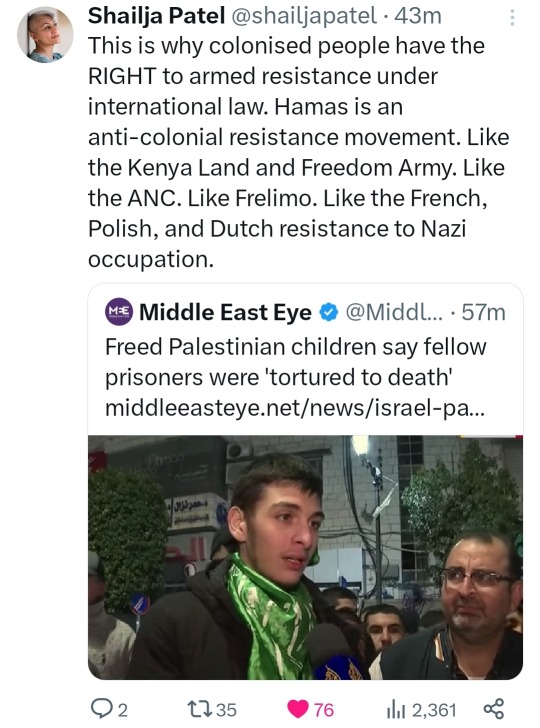
Shailja Patel on X, formerly known as Twitter writes: This is why colonised people have the RIGHT to armed resistance under international law. Hamas is an anti-colonial resistance movement. Like the Kenya Land and Freedom Army. Like the ANC. Like Frelimo. Like the French, Polish, and Dutch resistance to Nazi occupation. [source: @ shailjapatel]
Context: They are reacting to a post made by Middle East Eye on X- "Freed Palestinian children say fellow prisoners were 'tortured to death'" [11/27/23]
#feminist#feminism#social justice#freepalastine🇵🇸#palestine#free palestine#free gaza#israel is a terrorist state#from the river to the sea palestine will be free#current events
216 notes
·
View notes
Text

Dr. Eduardo Mondlane (June 20, 1920 - February 3, 1969) an educator, nationalist, and leader of the Mozambique independence movement, was born in the Gaza District of Southern Mozambique. He was the child of a Tsonga chief, the fourth of sixteen sons, and the only one of his family to receive a primary education.
He attended several mission primary schools and worked as a shepherd for part of his youth before obtaining a scholarship to attend a Presbyterian secondary school in Transvaal, South Africa. He was admitted to Witwatersrand University, he was expelled from South Africa because his views came into conflict with the government’s apartheid policies.
He was accepted into the University of Lisbon, Portugal but transferred to Oberlin College. He obtained a BA in Sociology and Anthropology from Oberlin College and completed a Ph.D. in Sociology from Northwestern University. He became the leader of Frente de Libertacao de Mocambique, He always made education for young Africans one of his foremost priorities, creating scholarship opportunities for Mozambican children in education.
He moved to Dar es Salaam, Tanzania, where he became president of FRELIMO, With the backing of the Soviet Union and many African nations, FRELIMO launched a guerrilla war against the colonial Portuguese government to win Mozambique’s independence. With him as president of FRELIMO, the campaign for independence was a campaign for a socialist state.
He was killed by a bomb which had been disguised as a notebook and sent to him by unknown assassins. FRELIMO continued to fight for independence. On June 25, 1975, FRELIMO was given control of Mozambique and the country gained its independence. #africanhistory365 #africanexcellence
10 notes
·
View notes
Text
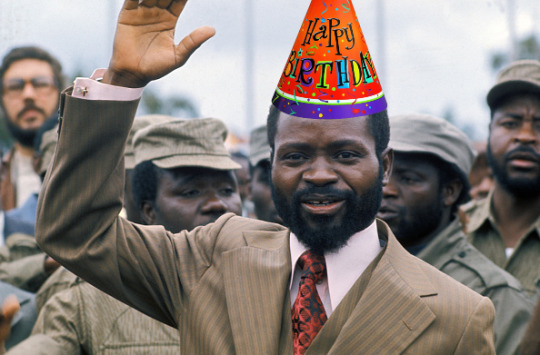
Happy birthday, Samora Machel! (September 29, 1933)
The first President of Mozambique and a leader in the struggle for independence against Portugese colonial rule, Samora Machel was born to a farming family and witnessed from a young age the inequities of the colonial system as his father was forced to accept lower prices for his crops than those paid to white farmers and was compelled to grow cotton for export. Machel became politically active while working at a hospital, protesting against the disparity in wages between black and white nurses. He crossed the border into Tanzania to join FRELIMO, the Liberation Front of Mozambique, and engage in armed struggle against colonial rule. He quickly rose through the ranks to become a key leader in FRELIMO, becoming its president in 1970. Machel, like previous FRELIMO leader Eduardo Mondlane, identified politically as a Marxist-Leninist, and under his leadership FRELIMO developed from a broadly nationalist organization into a Marxist-Leninist movement. After the Carnation Revolution overthrew the Estado Novo in Portugal, the new Portugese government suggested a referendum on Mozambican independence, which Machel rejected, vowing no end to the war until Mozambique was free on its own terms. Machel and FRELIMO were ultimately victorious, and independence was achieved in 1975. Machel proclaimed the People's Republic of Mozambique, and his government moved quickly to build socialism in Mozambique, instituting land reform, nationalizing healthcare and education, abolishing landlordism, and stripping the Catholic Church of institutional privilege. Machel also continued the struggle against colonialism in Africa, supporting the Zimbabwean struggle, aiding the African National Congress, and fighting against internal rebels sponsored by Rhodesia and South Africa. He died in a plane crash in 1986, under circumstances that continue to raise suspicion.
“You don't ask a slave if he wants to be free, particularly when he is already in revolt, and much less if you happen to be a slave-owner.”
255 notes
·
View notes
Text
youtube
On Palestine, G4S, and the Prison-Industrial Complex Speech at SOAS in London
(Angela Davis, December 13, 2013)
Transcript from the book Freedom Is a Constant Struggle
When this event highlighting the importance of boycotting the transnational security corporation G4S was organized, we could not have known that it would coincide with the death and memorialization of Nelson Mandela.
As I reflect on the legacies of struggle we associate with Mandela, I cannot help but recall the struggles that helped to forge the victory of his freedom and thus the arena on which South African apartheid was dismantled. Therefore I remember Ruth First and Joe Slovo, Walter and Albertina Sisulu, Govan Mbeki, Oliver Tambo, Chris Hani, and so many others who are no longer with us. In keeping with Mandela’s insistence of always locating himself within a context of collective struggle, it is fitting to evoke the names of a few of his comrades who played pivotal roles in the elimination of apartheid.
While it is moving to witness the unanimous and continued outpouring of praise for Nelson Mandela, it is important to question the meaning of this sanctification. I know that he himself would have insisted on not being elevated, as a single individual, to a secular sainthood, but rather would have always claimed space for his comrades in the struggle and in this way would have seriously challenged the process of sanctification. He was indeed extraordinary, but as an individual he was especially remarkable because he railed against the individualism that would single him out at the expense of those who were always at his side. His profound individuality resided precisely in his critical refusal to embrace the individualism that is such a central ideological component of neoliberalism.
I therefore want to take the opportunity to thank the countless numbers of people here in the UK, including the many then-exiled members of the ANC and the South African Communist Party, who built a powerful and exemplary antiapartheid movement in this country. Having traveled here on numerous occasions during the 1970s and the 1980s to participate in antiapartheid events, I thank the women and men who were as unwavering in their commitment to freedom as was Nelson Mandela. Participation in such solidarity movements here in the UK was as central to my own political formation as were the movements that saved my life.
As I mourn the passing of Nelson Mandela I offer my deep gratitude to all of those who kept the antiapartheid struggle alive for so many decades, for all the decades that it took to finally rid the world of the racism and repression associated with the system of apartheid. And I evoke the spirit of the South African Constitution and its opposition to racism and anti-Semitism as well as to sexism and homophobia.
This is the context within which I join with you once more to intensify campaigns against another regime of apartheid and in solidarity with the struggles of the Palestinian people. As Nelson Mandela said, “We know too well that our freedom is incomplete without the freedom of the Palestinians.”
Mandela’s political emergence occurred within the context of an internationalism that always urged us to make connections among freedom struggles, between the Black struggle in the southern United States and the African liberation movements—conducted by the ANC in South Africa, the MPLA in Angola, SWAPO in Namibia, FRELIMO in Mozambique, and PAIGC in Guinea Bissau and Cape Verde. These international solidarities were not only among people of African descent but with Asian and Latin American struggles as well, including ongoing solidarity with the Cuban revolution and solidarity with the people struggling against US military aggression in Vietnam.
A half-century later we have inherited the legacies of those solidarities—however well or however badly specific struggles may have concluded—as what produced hope and inspiration and helped to create real conditions to move forward.
We are now confronted with the task of assisting our sisters and brothers in Palestine as they battle against Israeli apartheid today. Their struggles have many similarities with those against South African apartheid, one of the most salient being the ideological condemnation of their freedom efforts under the rubric of terrorism. I understand that there is evidence indicating historical collaboration between the CIA and the South African apartheid government—in fact, it appears that it was a CIA agent who gave SA authorities the location of Nelson Mandela’s whereabouts in 1962, leading directly to his capture and imprisonment.
Moreover, it was not until the year 2008—only five years ago—that Mandela’s name was taken off the terrorist watch list, when George W. Bush signed a bill that finally removed him and other members of the ANC from the list. In other words when Mandela visited the US after his release in 1990, and when he later visited as South Africa’s president, he was still on the terrorist list and the requirement that he be banned from the US had to be expressly waived.
The point I am making is that for a very long time, Mandela and his comrades shared the same status as numerous Palestinian leaders and activists today and that just as the US explicitly collaborated with the SA apartheid government, it continues to support the Israeli occupation of Palestine, currently in the form of over $8.5 million a day in military aid. We need to let the Obama administration know that the world knows how deeply the US is implicated in the occupation.
It is an honor to participate in this meeting, especially as one of the members of the International Political Prisoners Committee calling for the freedom of Palestinian political prisoners, recently formed in Cape Town, and also as a member of the jury of the Russell Tribunal on Palestine. I would like to thank War on Want for sponsoring this meeting and progressive students, faculty, and workers at SOAS, for making it possible for us to be here this evening.
This evening’s gathering specifically focuses on the importance of expanding the BDS movement—the boycott, divestment, and sanctions movement called for by Palestinian civil society—which has been crafted along the lines of the powerful model of the antiapartheid movement with respect to South Africa. While there numerous transnational corporations have been identified as targets of the boycott, Veolia for example, as well as Sodastream, Ahava, Caterpillar, Boeing, Hewlett Packard, and others, we are focusing our attention this evening on G4S.
G4S is especially important because it participates directly and blatantly in the maintenance and reproduction of repressive apparatuses in Palestine—prisons, checkpoints, the apartheid wall, to name only a few examples.
G4S represents the growing insistence on what is called “security” under the neoliberal state and ideologies of security that bolster not only the privatization of security but the privatization of imprisonment, the privatization of warfare, as well as the privatization of health care and education.
G4S is responsible for the repressive treatment of political prisoners inside Israel. Through Addameer, directed by Sahar Francis, we have learned about the terrifying universe of torture and imprisonment which is faced by so many Palestinians but also about their hunger strikes and other forms of resistance.
G4S is the third-largest private corporation in the world—behind Walmart, which is the largest, and Foxconn, the second largest.
On the G4S website, one discovers that the company represents itself as capable of providing protection for a broad range of “people and property,” from rock stars and sports stars to “ensuring that travelers have a safe and pleasant experience in ports and airports around the world to secure detention and escorting of people who are not lawfully entitled to remain in a country.”
“In more ways than you might realize,” the website reads, “G4S is securing your world.” We might add that in more ways that we realize, G4S has insinuated itself into our lives under the guise of security and the security state—from the Palestinian experience of political incarceration and torture to racist technologies of separation and apartheid; from the wall in Israel to prison-like schools in the US and the wall along the US-Mexico border. G4S-Israel has brought sophisticated technologies of control to HaSharon prison, which includes children among its detainees, and Damun prison, which incarcerates women.
Against this backdrop, let us explore the deep involvement of G4S in the global prison-industrial complex. I am not only referring to the fact that the company owns and operates private prisons all over the world, but that it is helping to blur the boundary between schools and jails. In the US schools in poor communities of color are thoroughly entangled with the security state, so much so that sometimes we have a hard time distinguishing between schools and jails. Schools look like jails; schools use the same technologies of detection as jails and they sometimes use the same law enforcement officials. In the US some elementary schools are actually patrolled by armed officers. As a matter of fact, a recent trend among school districts that cannot afford security companies like G4S has been to offer guns and target practice to teachers. I kid you not.
But G4S, whose major proficiencies are related to security, is actually involved in the operation of schools. A website entitled “Great Schools” includes information on Central Pasco Girls Academy in Florida, which is represented as a small alternative public school. If you look at the facilities page of the G4S website you will discover this entry: “Central Pasco Girls Academy serves moderate-risk females, ages 13-18, who have been assessed as needing intensive mental health services.” G4S indicates that they use “gender-responsive services” and that they address sexual abuse and substance abuse, et cetera. While this may sound relatively innocuous, it is actually a striking example of the extent to which security has found its way into the educational system, and thus also of the way education and incarceration have been linked under the sign of capitalist profit. This example also demonstrates that the reach of the prison-industrial complex is far beyond the prison.
This company that provides “security” for numerous agencies as well as rehabilitation services for young girls “at risk” in the United States, while operating private prisons in Europe, Africa, and Australia, also provides equipment and services to Israeli checkpoints in the West Bank along the route of Israel’s apartheid wall as well as to the terminals from which Gaza is kept under continuous siege. G4S also provides goods and services to the Israeli police in the West Bank, while it offers security to private businesses and homes in illegal Israeli settlements in occupied Palestine.
As private prison companies have long recognized, the most profitable sector of the prison-industrial complex is immigrant detention and deportation. In the US, G4S provides transportation for deportees who are being ushered out of the US into Mexico, thus colluding with the increasingly repressive immigration practices inside the US. But it was here in the UK where one of the most egregious acts of repression took place in the course of the transportation of an undocumented person.
When I was in London during the month of October, speaking at Birkbeck School of Law, I spoke to Deborah Coles, codirector of the organization Inquest, about the case of Jimmy Mubenga, who died at the hands of G4S guards in the course of a deportation from the UK to Angola. On a British Airways plane, handcuffed behind his back, Mubenga was forcibly pushed by G4S agents against the seat in front of him in the prohibited “carpet karaoke” hold in order to prevent him from vocalizing his resistance. The use of such a term for a law enforcement hold, albeit illegal, is quite astonishing. It indicates that the person subject to the hold is compelled to “sing into the carpet”—or in the case of Mubenga—into the upholstered seat in front, thus rendering his protests muffled and incomprehensible. As Jimmy Mubenga was held for forty minutes, no one intervened. By the time there was finally an attempt to offer him first aid, he was dead.
This appalling treatment of undocumented immigrants from the UK to the US compels us to make connections with Palestinians who have been transformed into immigrants against their will, indeed into undocumented immigrants on their own ancestral lands. I repeat—on their own land. G4S and similar companies provide the technical means of forcibly transforming Palestinian into immigrants on their own land.
As we know, G4S is involved in the operation of private prisons all over the world. The Congress of South African Trade Unions (CO-SATU) recently spoke out against G4S, which runs the Mangaung Correctional Centre in the Free State. The occasion for their protest was the firing of approximately three hundred members of the police union for staging a strike. According to the COSATU statement:
G4S’s modus operandi is indicative of two of the most worrying aspects of neoliberal capitalism and Israeli apartheid: the ideology of “security” and the increasing privatization of what have been traditionally state run sectors. Security, in this context, does not imply security for everyone, but rather, when one looks at the major clients of G4S Security (banks, governments, corporations etc.) it becomes evident that when G4S says it is “Securing your World,” as the company slogan goes, it is referring to a world of exploitation, repression, occupation and racism.
When I traveled to Palestine two years ago with a delegation of indigenous and women-of-color scholar/activists, it was the first time the members of the delegation had actually visited Palestine. Most of us had been involved for many years in Palestine solidarity work, but we were all thoroughly shocked to discover that the repression associated with Israeli settler colonialism was so evident and so blatant. The Israeli military made no attempt to conceal or even mitigate the character of the violence they inflicted on the Palestinian people.
Gun-carrying military men and women—many extremely young—were everywhere. The wall, the concrete, the razor wire everywhere conveyed the impression that we were in prison. Before Palestinians are even arrested, they are already in prison. One misstep and one can be arrested and hauled off to prison; one can be transferred from an open-air prison to a closed prison.
G4S clearly represents these carceral trajectories that are so obvious in Palestine but that also increasingly characterize the profit-driven moves of transnational corporations associated with the rise of mass incarceration in the US and the world.
On any given day there are almost 2.5 million people in our country’s jails, prisons, and military prisons, as well as in jails in Indian country and immigrant detention centers. It is a daily census, so it doesn’t reflect the numbers of people who go through the system every week or every month or every year. The majority are people of color. The fastest-growing sector consists of women —women of color. Many are queer or trans. As a matter of fact, trans people of color constitute the group most likely to be arrested and imprisoned. Racism provides the fuel for maintenance, reproduction, and expansion of the prison-industrial complex.
And so if we say abolish the prison-industrial complex, as we do, we should also say abolish apartheid, and end the occupation of Palestine!
In the United States when we have described the segregation in occupied Palestine that so clearly mirrors the historical apartheid of racism in the southern United States of America—and especially before Black audiences—the response often is: “Why hasn’t anyone told us about this before? Why hasn’t anyone told us about the segregated highways leading from one settlement to another, about pedestrian segregation regulated by signs in Hebron—not entirely dissimilar from the signs associated with the Jim Crow South. Why hasn’t anyone told us this before?”
Boycott G4S! Support BDS!
Just as we say “never again” with respect to the fascism that produced the Holocaust, we should also say “never again” with respect to apartheid in South Africa, and in the southern US. That means, first and foremost, that we will have to expand and deepen our solidarity with the people of Palestine. People of all genders and sexualities. People inside and outside prison walls, inside and outside the apartheid wall.
Palestine will be free!
Thank you.
25 notes
·
View notes
Note
Thinking about how after the 25 April revolution in Portugal, the revolutionary government of 74/75 (which explicitly supported MPLA, FRELIMO and Fretilin against the other right-wing/US backed groups after their independence) wanted Portugal to immediately leave NATO (which was one of the first members under the dictatorship, remember), navy ships stationed in front of the presidential palace in Lisbon all exploded… wonder how or why that happened… (Fun fact: did you know the US gave permission for Spain - still a dictatorship at the time - to invade and annex Portugal in case they turned "full communist"? Sounds similiar to the backing Kissinger gave Suharto to invade East Timor after Fretilin came to power. Except a CIA-led coup happened in late 1975, and in 1976 it became a US/NATO friendly nation (and because of this several marxist & maoist movements appeared to fight against NATO and also expose former fascist members of PIDE -the dictatorship's fascist police- that were in/supported the new government, but they did not last long).
Sorry for oversharing lkhjksdadsal but not many know of this and I think it's an interesting subject. Also fun fact: during 1974-1975 Portugal and the DPRK were pretty close (relations which lasted until 2017, when the US pretty much made those relations end).
This is a forgotten and generally unknown part of recent history, thank you for shedding light on it.
30 notes
·
View notes
Text
Ney Gani Promete Doar 45 Mil Pares de Uniformes Escolares e 5 Mil Carteiras as Escolas de Quelimane
45 mil pares de uniforme escolares e 5 mil carteira foi a promessa do cabeça de lista do partido Frelimo, Ney Gani, nesta terça-feira (03) na caça ao voto realizada no bairro 17 de Setembro.
Ney Gani disse que, “nós temos planos de dar uniformes escolares para as crianças, são 45 mil pares de uniformes escolares, preparados, quando nós entrarmos vamos dar. Nas escolas são 5 mil carteiras que nós…

View On WordPress
0 notes
